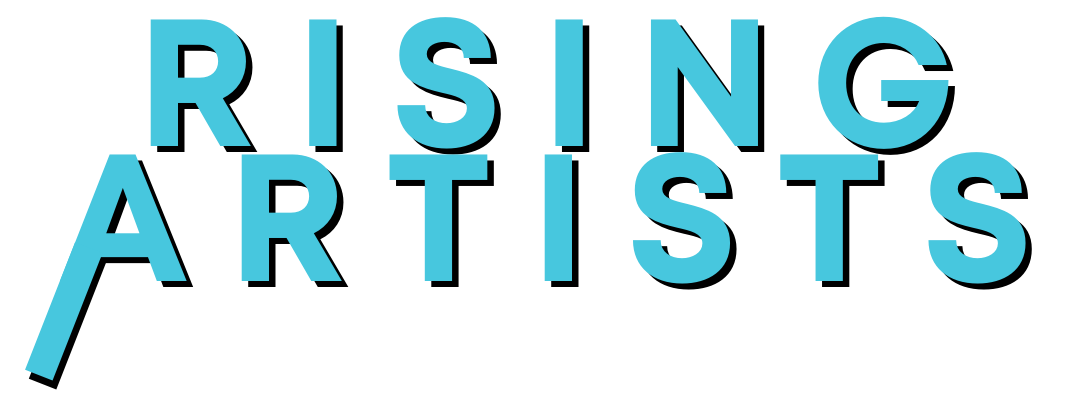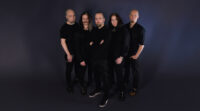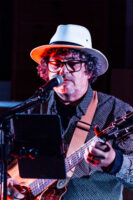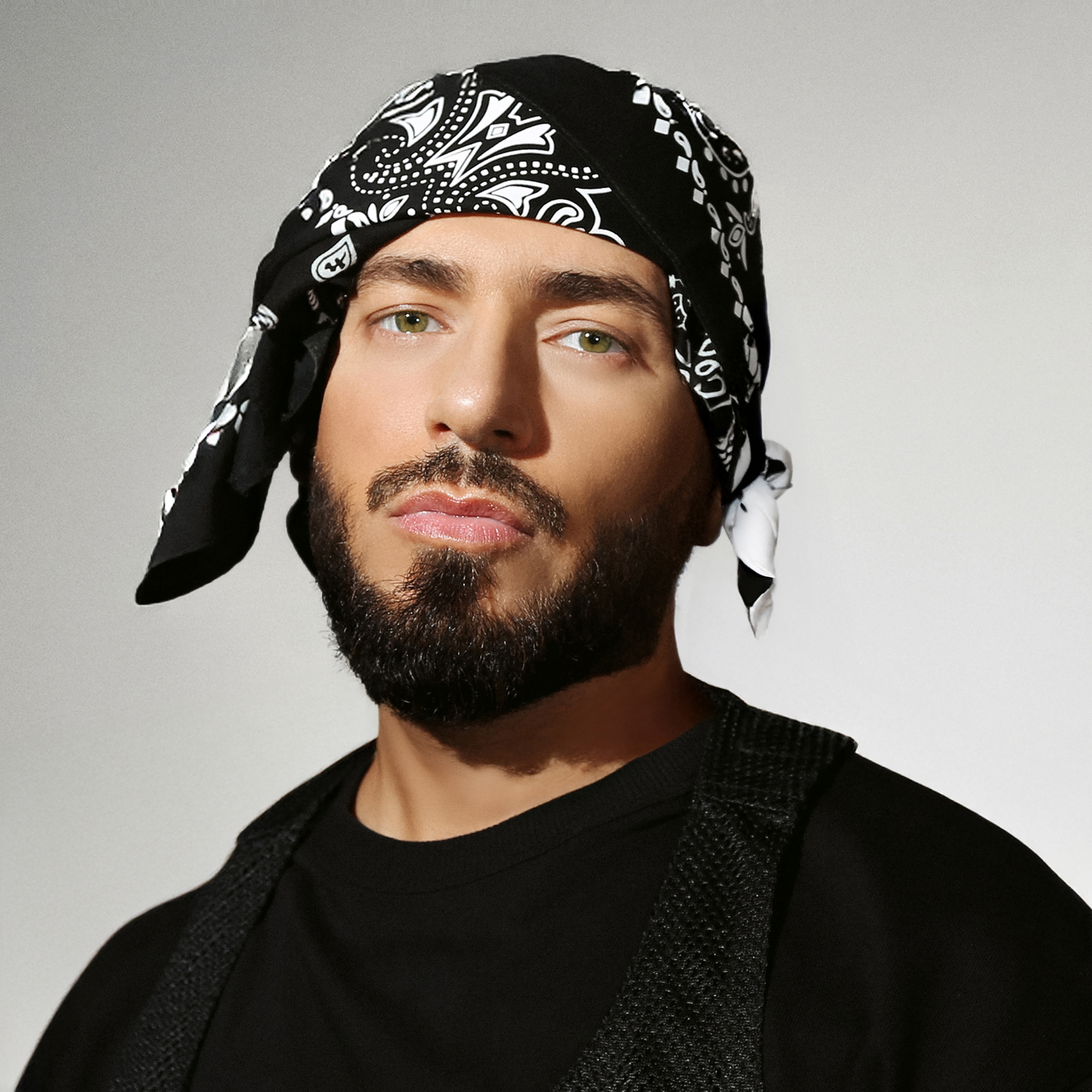Q: “Our Brilliant Destruction” is a moving track about climate change causing burning temperatures. Walk us through the process of writing and producing this song.
THE SEA AT MIDNIGHT: First of all, thank you for the kind words on the song. That truly means a lot to me.
As for the writing process, I always find it hard to explain because, in many ways, I don’t feel like I “write” songs—they find me. The initial spark is a mystery. I could be strumming my guitar, just messing around, and suddenly a riff or a chord progression appears out of nowhere, sometimes even carrying a melody or a lyric with it. Where does that come from? I have no idea.
I can go days, weeks, even months without a single new idea, and then suddenly, a song begins to emerge. You can’t force it—if anything, the harder you try, the more elusive it becomes. It feels like the songs already exist, buried somewhere, and my job is just to unearth them. I might see a fragment poking out of the dirt, start digging, and gradually more is revealed. The process is never linear, and you can’t rush it. You just keep tugging at the thread, untangling the knot, until somehow everything falls into place.
With Our Brilliant Destruction, the verse chord progression came first, then a melody, then the lyrics. I kept playing around with it, and one night, I suddenly burst into the chorus. It was like a light went on—oh, this is what the song is about. I think my deep concern about climate change mixed with the musical ether, and it became clear that this song was about the earth heating up and the devastating wildfires that come with it.
When it comes to producing Our Brilliant Destruction, I’m incredibly lucky to work with Chris King of the band Cold Showers. He’s engineered, produced, and mixed every The Sea At Midnight song to date. Beyond being a talented multi-instrumentalist with incredible musical instincts, he’s also just a fantastic human—kind, patient, funny, and constantly overflowing with creative ideas.
Our process is always the same. First, I play the song for Chris on acoustic guitar, and he gives feedback from a producer’s perspective. I don’t remember exactly what he suggested when we first workshopped this song, but once we had a rough idea, we recorded an acoustic guitar track with a scratch vocal. From there, we started building.
The first thing Chris always does is lay down drum ideas, and then we tweak them together. He came up with the percussive tom-tom fills that form the rhythmic backbone of the song, and I was completely blown away—I didn’t see that coming, but I loved it. When I first took a stab at the electric guitar on the chorus, I think I was inspired by those drums, and after recording it, we both noted that it had a bit of a U2 feel, which neither of us had envisioned initially. Chris often says that when recording, songs will tell you what they need, and this was one of those moments.
From there, we kept layering and refining until everything felt right. Chris is always focused on making sure the music supports and enhances the lyrics and melody—that’s his number one mission. One standout moment was when he came up with the heavier distorted guitar part at the end, which I think makes for the perfect outro.
It’s always an organic, collaborative process, and I couldn’t ask for a better producer to bring these songs to life.
Q: Much of your music centers around the topic of climate change. What reasons, or personal experiences, draw you to this subject?
THE SEA AT MIDNIGHT: I’ve been, for lack of a better word, a student of climate change for a long time. Calling it an “interest” doesn’t quite capture the gravity of the issue, but I truly believe it’s the number one challenge facing humanity. I’ve spent years reading about it, attending talks, watching documentaries, and speaking with knowledgeable people to educate myself. The more you learn, the more you realize how urgent and far-reaching the crisis is.
We’re seeing the consequences play out in real-time—devastating wildfires, hurricanes, tornadoes, floods, droughts, melting glaciers, and rising sea levels. Just recently, scientists reported that the North Pole has shifted due to climate change, which sounds pretty serious to me. Even on a smaller scale, things are changing—traditional ski areas struggling with lack of snow, extreme weather becoming the new normal. Once you start paying attention, the scope of it all is overwhelming.
Living in California, we now have a fire season—something that shouldn’t even exist. Last year, we had torrential rains and flooding, but for years before that, we were in a severe drought. And after prolonged drought, the fires always come. It’s a cycle that keeps intensifying. I also have family members in other states who’ve lived through terrible tornadoes, hurricanes, and floods. The trajectory is alarming, and it’s impossible to ignore. That’s why it keeps showing up in my music. Songwriting is how I process things, and climate change is something I can’t look away from.
Q: What has been one of the highlights of your music career so far?
THE SEA AT MIDNIGHT: Ha! I don’t mean to laugh, but I don’t really think of myself as having a music career in the traditional sense—a career actually pays, right? I have a day job that funds my music addiction. But if I had to pick a highlight, this whole journey of releasing music as The Sea At Midnight is definitely at the top.
For a long time, I thought my days of being in a band or recording music were over. Then in 2019, I met Chris, and he convinced me to record some of my songs. It started with just a single—two songs—but that turned into a five-song EP, then an eight-song debut album, which led to the follow-up album Too Close To The Sun, and now these climate change-themed songs I’ve been releasing over the past few months.
Initially, this was just going to be a recording project. But once again, Chris pushed me out of my comfort zone, convincing me to put a band together and play live. So in 2024, with his help, I formed a band and started playing shows around LA. It’s been an incredible and unexpected ride, and honestly, I’m just grateful to still be creating and sharing music.
Q: Music has long been a source for expressing resistance or encouraging social and political protest. Are there any particular social commentary songs that have inspired you?
THE SEA AT MIDNIGHT: At the end of the day, it’s pretty hard to top Senator’s Son by Creedence Clearwater Revival for me. Even as a kid, coming from my background, I’ve always related to that song on a visceral level. But beyond individual tracks, there are two artists who truly inspire me when it comes to social commentary in music—Merryl Street and Gary Numan.
Merryl tackles topics like political and church corruption, poverty, the class system, extortionist landlords, social injustice, and the erosion of family ties. His songs are so heartfelt and hard-hitting—his message, use of language, conviction, and melody completely blow me away. To me, he’s a colossal talent.
What actually surprises me is the lack of songs addressing climate change. But Gary Numan’s last two albums have literally been all about it. His 2017 album, Savage (Songs from a Broken World), imagines a post-apocalyptic world turned to desert due to global warming, blending Western and Eastern cultural influences in the aftermath. Then, in 2021, he followed up with Intruder, which takes an even more striking perspective—an anthropomorphized Earth fighting back against humanity for its environmental destruction. As Numan put it, climate change is the Earth’s way of saying, enough is enough.
To me, both albums are absolute masterpieces on climate change, and they’ve been a huge inspiration. It’s rare to see artists tackle the subject so directly, and I admire the way Numan weaves it into his music with such depth and urgency.
Q: What is coming up next for you?
THE SEA AT MIDNIGHT: I’ll be releasing a couple more climate change-themed songs over the next few months, culminating in an EP titled Burning, which drops on Earth Day, April 22nd. I’m also in the studio recording new songs for a follow-up album to the EP, so there’s definitely more music on the way. My problem is that I tend to write songs faster than I can afford to record them—if only the budget could keep up!
On the live front, we’ve got shows booked for February and March, and hopefully, more opportunities will come up. We’ve had other offers that didn’t quite work out scheduling-wise, but those bookers have said they’ll continue reaching out for future dates. Really hoping for more chances to bring these songs to the stage. Now that I’ve been out there over the past year my love of performing has most definitely returned.
Q: What would you like to tell your supporters out there?
THE SEA AT MIDNIGHT: Honestly, just a huge thank you. It truly means the world to me that people take the time to listen to my music, connect with it, come out to shows, send me messages, take the time and have the interest to write reviews, ask for interviews – it touches me deeply. Releasing these songs—especially ones that touch on heavy themes like climate change—can sometimes feel like sending a message in a bottle, hoping it reaches someone. So when people respond, whether through a kind word, a message, or simply by listening, it’s incredibly meaningful.
I’m truly beyond grateful for the support, and I hope to keep making music that resonates. Thank you for being part of this journey!
Interviewed by Taylor Berry
FOLLOW THE SEA AT MIDNIGHT:













